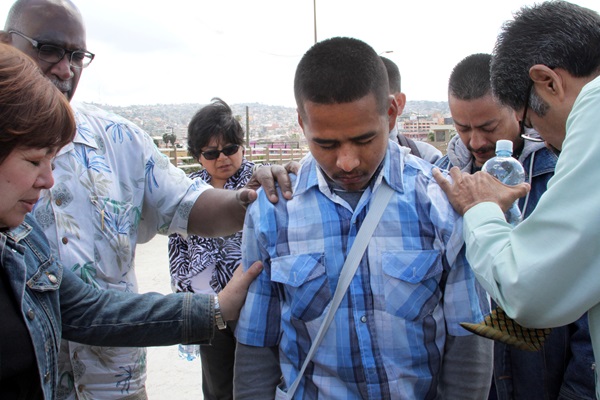"I was a stranger and you welcomed me …" (Matthew 25:35)
The Rev. Juan Guerrero, a United Methodist leader in Honduras, knows well the conditions that are driving families in his country to send their children through perilous channels to the U.S.
"[A] fellow United Methodist in Ciudad España had to sell his house to pay a network of smugglers who kidnapped one of his children," Guerrero says. "When the boy was released, he described how another boy was killed in his presence while his parents were on the phone, to intimidate them and force them to sell their properties in Honduras to pay the ransom."
Threats of kidnapping and death by criminal gangs, combined with poverty, have led to thousands of unaccompanied minors fleeing to the United States from Central America.
The United Methodist Church is responding in ways few organizations can. Through its network of churches and conferences, it is providing care to children far from home. Through expertly run programs, it is offering relief and legal counsel. And through general agencies, it is providing advocacy and resources.
What does the church say?
"As Christians and United Methodists, we are called to love the stranger in our midst and to treat that stranger as we would our own family," The United Methodist Church states in "Call for Comprehensive Immigration Reform," contained in the 2012 Book of Resolutions.
This care for immigrants is rooted in the Bible. "In the New Testament, Jesus' life begins as a refugee to Africa when he and his family flee to Egypt to escape Herod's infanticide," the church states in "Welcoming the Migrant to the U.S."
Immigration is addressed in several other statements adopted by General Conference, the only entity that speaks for the entire church.
Four ways you can act
The Council of Bishops' executive committee is asking all United Methodists to "pray, reflect and engage in acts of compassion."
Every person of faith can:
- Pray: Pray for the children and their families, their countries and those responding to their needs.
- Learn: Understand the underlying issues and the personal stories of the children. Information on the United Methodist response can be found on UMC.org/immigration.
- Support the humanitarian response: The United Methodist Committee on Relief, Justice For Our Neighbors, United Methodist Women, Church World Service and other organizations are responding. Individual congregations can seek to work with border churches and ministries.
- Advocate: Urge lawmakers not to repeal provisions of human trafficking laws that protect minors or to expedite the deporting of children. The General Board of Church and Society provides information on advocacy, and a General Board of Discipleship resource also offers action steps.
A United Methodist-operated Mexican Border Ministry Network, with more than 16 service locations, is helping immigrants who have been processed and released, without resources, to appear at a later date, says Greg Forrester, a staff executive with the United Methodist Committee on Relief. Donations to UMCOR for Advance #901670, "Immigration Crisis," will support the agency's work with responding faith groups in the area.
Tools for congregations
UMC.org/immigration offers a hub of resources. Here are additional possibilities:
- Engagement: The General Board of Church and Society offers a resource on welcoming immigrants. The National Plan for Hispanic/Latino Ministry and MARCHA, the church's Hispanic/Latino caucus, also offer resources for responding.
- Sermon Starters: The denomination's resolutions, as well as World Council of Churches resources, are available.
- Worship Resources: Try You Made Us In Your Image, from the General Board of Discipleship, or adapt Church World Service's worship resource for World Refugee Day.
- Discussion Aids: See this video, produced by California Endowment, on the California-Pacific Conference site: "What would you say to refugee children?"
- Group Studies: Options include Welcoming the Stranger: A Bible Study from Church World Service, and "Immigration and the Bible" (in three languages) and a youth study on migration from United Methodist Women.





